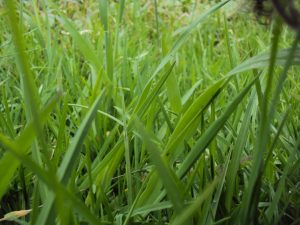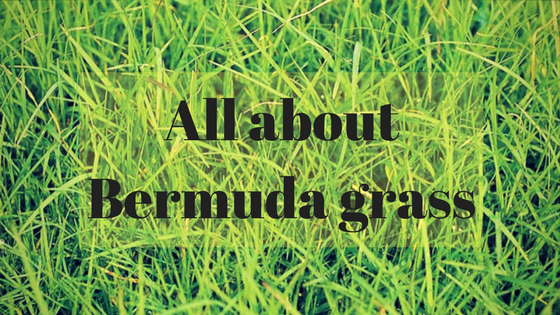All about Bermuda grass
There are two different types of Bermuda grasses. These two types are the most common Bermuda grass and the hybrid Bermuda grass. The hybrid Bermuda is what you will most likely find on lawns. The hybrid Bermuda grass does not produce seed and therefore will not spread causing a lot of weeds.
 The common Bermuda grass is a fine textured green grass. The roots grow very deep into the ground, making the Bermuda able to withstand high temperatures and lots of drought. Since the common permuted grass can spread very rapidly, you must keep an eye on the grass to make sure that it does not spread where you do not want it to go. The turf of this grass is used for high traffic areas and can withstand lots of foot traffic.
The common Bermuda grass is a fine textured green grass. The roots grow very deep into the ground, making the Bermuda able to withstand high temperatures and lots of drought. Since the common permuted grass can spread very rapidly, you must keep an eye on the grass to make sure that it does not spread where you do not want it to go. The turf of this grass is used for high traffic areas and can withstand lots of foot traffic.
You will need to keep the Bermuda out and open so it can reach the sun. It does not do well in the shade or the wintertime. During the winter months, you will see the grass turned brown. If you want to keep it green during these times, you will want to overseed the grass with a rye grass seed.
The hybrid Bermuda grass is the more greener and softer of the two. The hybrid Bermuda will grow just as quickly as the common Bermuda grass does. You will have to watch and oversee this grass to make sure that it does not grow or you do not want it to. It is also a very deep-rooted, fast-growing, drought tolerant grass. When temperatures get below 60°, the hybrid grass can start to turn brown. You will want to make sure that you overseed with some rye grass seeds to keep it green beer in the winter months.
 Both types of Bermuda grasses are more commonly seen in the south eastern and southwestern United States. The reason being is for the very hot and warm temperature. The grass grows and thrives in this environment. You will want to plan some Bermuda grass in your yard if you do not want to water it all the time. This kind of grass does not require much water, which can help you out a lot on your water bill.
Both types of Bermuda grasses are more commonly seen in the south eastern and southwestern United States. The reason being is for the very hot and warm temperature. The grass grows and thrives in this environment. You will want to plan some Bermuda grass in your yard if you do not want to water it all the time. This kind of grass does not require much water, which can help you out a lot on your water bill.
Bermuda grass, also known as Dog’s Tooth Grass, is a very popular choice for grass because it is pretty easy to maintain and care for. This grass is a perennial grass native to tropical regions; it loves the hot sun. Bermuda holds up well in heavily traveled areas so it is perfect for your back yard. It is quick growing, and with proper maintenance, your grass will grow strong and healthy. Bermuda grass is pretty resistant to insects and disease. Not only is it used in yards across America, but golf courses and parks as well.
Caring for your Bermuda grass begins before planting. First, make sure that the land is properly prepared. You can use an herbicide to kill the weeds and any old grass before you lay the grass seeds. Fertilize the soil using a pH neutralizing fertilizer. Now you are ready to spread your seeds or sprigs. Bermuda grass will grow pretty quickly. You should have a full lawn of grass within one year. Once your lawn is established, follow these simple tips to properly maintain it.
Maintaining your grass is a year-round commitment. It isn’t just something to care for during the spring and summer months; you have to care for it through all four seasons. However, more attention will be required during the warm months.
Mowing
Before beginning to mow, make sure your blade is sharp. If you are using a dull blade, you will damage the grass. You want to cut it cleanly, not rip it off. You should mow your grass often to keep it healthy. Be careful not to cut the grass too short; this is a common mistake. It is best to mow your grass when it is dry to avoid messy clumps of cut grass. Don’t rake up the clippings after mowing. Leave them to feed the grass.
Fertilizing
Fertilizing your grass is very important to ensure a healthy green lawn. The three most common fertilizers are; Nitrogen Fertilizer, Potassium Fertilizer and Phosphorus Fertilizer. Phosphorous fertilizer should be applied to your Bermuda grass three to four times in a year. Make sure you read the directions completely for the specific fertilizer you are using. And be sure to follow any safety precautions when laying fertilizer. If you have small children or pets, you will want to consider fertilizing less often.
To learn more about proper fertilizing, check out our Liquid Lawn Fertilizer Guide
Watering
Bermuda grass tolerates drought well. However, to keep your Bermuda grass green and healthy you should water your grass regularly. You should water your grass every 4-5 days giving it a good soaking each time. Be careful not to over water the grass. During rainy season, you can cut back on how much you are watering.
For more lawn watering tips, check out our Sprinkler Guide
With proper maintenance, your yard will be full of beautiful, lush Bermuda grass in no time. By maintaining a healthy green lawn, your family will have a wonderful place to enjoy the warm spring and summer months.
 Bermuda grass is one of the most popular grasses in the U.S. It has used extensively on golf courses, lawns, large landscapes, playgrounds, recreational parks, sports venues, etc. Originating in the country of Africa where it populated the open areas of the country, this transplanted grass has proven to be hardy in this country as well. Its origin, no doubt, explains its ability to go for long periods of time without much rain. It also has a high tolerance to sunlight. But even when the grass blades are burnt or damaged by insects or animal it manages to re-grow and reestablish itself in record time. Because it recovers so quickly, it is the perfect grass for high traffic areas such as those mentioned above.
Bermuda grass is one of the most popular grasses in the U.S. It has used extensively on golf courses, lawns, large landscapes, playgrounds, recreational parks, sports venues, etc. Originating in the country of Africa where it populated the open areas of the country, this transplanted grass has proven to be hardy in this country as well. Its origin, no doubt, explains its ability to go for long periods of time without much rain. It also has a high tolerance to sunlight. But even when the grass blades are burnt or damaged by insects or animal it manages to re-grow and reestablish itself in record time. Because it recovers so quickly, it is the perfect grass for high traffic areas such as those mentioned above.
One of the reasons that Bermuda grass is so hardy is because of its deep root system. This root system enables it to grow in temperatures as cold as thirty-five degrees Fahrenheit and as warm as ninety-five degrees Fahrenheit and higher. Even though Bermuda grass can easily survive periods of drought by slipping into a semi-dormant state, it absolutely thrives in warm, rainy weather. Its best growth spurts occur in air temperatures above sixty-four degrees Fahrenheit and ground temperatures from the high seventies and above.
Bermuda grass is also a very aggressive grass and once it has established itself, it is hard to get rid of. The nice thing about this is that it requires only moderate lawn care. You can miss more than a few waterings and grass-cuttings with no ill effects. It is very forgiving of your lawn negligence and does not need to be babied. Another benefit is that, if you have bare spots, Bermuda grass can produce lawn coverage amazingly fast – even from seed. And you rarely have to worry about weeds. In a fight with weeds, more often than not, the Bermuda grass will come out the winner. And finally, you rarely have to worry about your soil. Bermuda will grow in practically any type of soil – it is very versatile.
The bad thing about Bermuda grass’ aggressiveness is that it can easily overrun other plants that you have in your garden. Or it can overrun your neighbors property. It just won’t stay put. It can also cause problems in farmland areas where Bermuda grass seed my be intermixed with crop seeds, eventually posing a challenge to the farmer’s crops when they both fight for the same resources. If you ever need to get rid of it, about the only way to do it, without poisoning the ground and any other plants in the area, is to dig up its root systems.
Even though you will find in in all areas of the country, Bermuda grass has a special affinity for the South. Many parts of the South, such as Alabama, Mississippi, and Florida, have temperatures and weather conditions very close to its place of origin making it almost like a second home.



Comments are closed, but trackbacks and pingbacks are open.